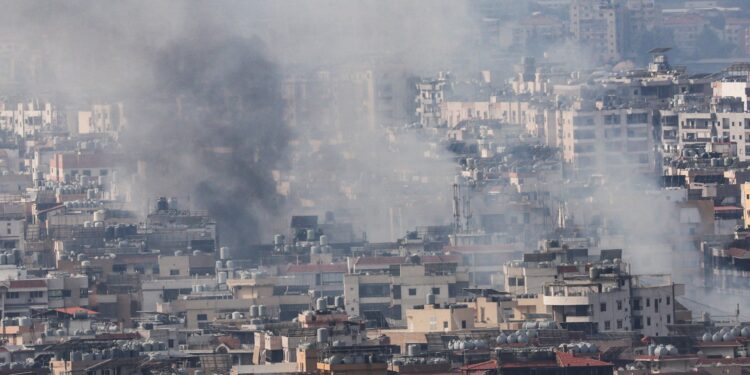Israel has expanded attacks on southern Lebanon and pounded the capital Beirut’s southern suburbs as the Lebanese armed group Hezbollah has claimed a series of missile attacks on northern Israel, including near the city of Haifa.
A Lebanese security source said an Israeli strike on Monday hit the al-Kokoudi area, a few kilometres from Beirut Rafic Hariri International Airport and close to Hezbollah’s stronghold in the suburb of Dahiyeh, which has been repeatedly targeted over the past few weeks.
“Israel conducted an air strike near the airport,” the official told the AFP news agency, requesting anonymity to discuss sensitive matters.
Lebanon’s official National News Agency had earlier said Israel launched an air raid on the al-Kokoudi area, later reporting “six strikes” on neighbourhoods in Dahiyeh.
The Israeli military said it carried out a “precise attack” on Beirut without providing details.
The attack came after the southern suburbs were hit by more than 30 strikes overnight, the heaviest bombardment since September 23, the day Israel began a significant escalation in its assault on Lebanon, the NNA said.
The targets included a petrol station on the main highway leading to the Beirut airport and a warehouse for medical supplies, the agency said.
The Israeli military said the air force was carrying out extensive bombings of Hezbollah targets in southern Lebanon and two Israeli soldiers were killed in border-area combat, taking Israel’s military death toll inside Lebanon so far to 11.
The NNA reported a series of strikes targeted “more than 30 towns and villages in the Tyre district” in the country’s south,
The Israeli army earlier announced it had deployed another division to participate in operations in Lebanon.
Hezbollah said it targeted Israeli troops in two border villages in southern Lebanon. The Lebanese group said its fighters “bombed … a gathering of Israeli forces” in Maroun al-Ras with “a rocket salvo”.
The Lebanese group has reported several clashes in the Maroun al-Ras area over the past several days since Israel said it had begun “targeted” ground raids in the area.
Hezbollah later said its fighters “bombed … a gathering of Israeli enemy forces” in the nearby village of Blida “with a barrage of rockets and artillery shells”.
Haifa attacks
It also claimed a series of rocket attacks on northern Israel, including near the port city of Haifa “with a large rocket salvo” and on Israeli military positions. Later, the group said it targeted areas north of Haifa with another round of rockets.
At least 10 people were wounded in the initial attack on Haifa. It was the first time the port city has been hit since Israel and Hezbollah began trading fire in October last year. Haifa is situated on Israel’s Mediterranean coast, about 30km (19 miles) from the border with Lebanon.
In a statement, the Israeli army said about 135 rockets fired by Hezbollah had crossed from Lebanon into Israeli territory as of 5pm (14:00 GMT).
It said it would continue to operate against Hezbollah, adding that it hit more than 120 Hezbollah targets “within an hour”.
The Lebanese Ministry of Public Health said a year of Israeli attacks on the country had killed at least 2,083 people and wounded 9,869.
‘Major displacement crisis’
More than 1 million people have been displaced, mostly from towns and villages in southern Lebanon, according to local authorities.
United Nations High Commissioner for Refugees Filippo Grandi said Lebanon is seeing a “major displacement crisis” as a result of Israel’s escalating air campaign and some of the strikes have violated international law.
Grandi made his remarks during a visit to Beirut on Sunday.
The UN has appealed for $425.7m to respond to the humanitarian crisis. About 40 percent has been funded so far.
Grandi also said there had been “many instances of violations of international humanitarian law in the way the air strikes have been conducted that have destroyed or damaged civilian infrastructure”.
Two people working for Grandi’s agency have also been killed in the strikes.
Grandi said an attack that cut access to a major border crossing between Lebanon and Syria last week had also created an obstacle for civilians trying to flee to safety. The escalating violence has pushed both Lebanese citizens and Syrian refugees in Lebanon to cross the border en masse.
Meanwhile, a UN official told The Associated Press news agency the Israeli military is setting up a forward operating base close to a UN peacekeeping mission on the border in southern Lebanon.
The base puts peacekeepers there at risk, said the official, who spoke on condition of anonymity.
The UN peacekeeping mission in southern Lebanon, known as UNIFIL, said in a statement that it was concerned about “recent activities” by the Israeli military southeast of the Lebanese border town of Maroun al-Ras.
It did not give any details on what Israel was doing but said it was close to point 6-52, where Irish peacekeepers are positioned.
This comes days after UNIFIL refused the Israeli military’s request to vacate some of its positions before a ground incursion.
UNIFIL was created to oversee the withdrawal of Israeli soldiers from southern Lebanon after Israel’s 1978 invasion. The UN expanded its mission after the 2006 war between Israel and Hezbollah, allowing peacekeepers to deploy along the Israeli border.







